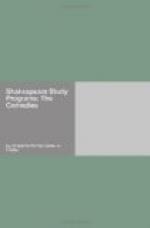QUERIES FOR DISCUSSION
Why is the choice of Hermia’s father for her no longer supported by the Duke? Does this imply a criticism on the inconsistency of allowing men their choice, and their brides none, with which Shakespeare was in sympathy, or is this only apparent to some modern minds?
ACT V
THE THREEFOLD MASK
If the central action of the play be considered as virtually concluded with the fourth Act, what office is performed by the fifth Act?
Notice that in it the three groups of characters constituting the play—the court group with the lovers; the ‘rude mechanicals’ and their ‘tedious brief scene,’ and the fairy train—are in this Act all brought upon the stage, the whole spectacle being set in the palace at Athens, in celebration of the wedding festivities of the ducal pair, which, as before noticed, is used as a sort of decorative frame for the play as a whole.
Examine the working-out of this unified presentation of all the personages. How are we to account for the silence of the women who were made to do so much towards the institution of the action? Show the poetic reasons for the entrance of Puck and the fairies last of all, and when the stage is empty.
POINTS. 1. Explanation of all mythical allusions. 2. Account of theories as to meaning of ‘The thrice three muses,’ etc., V. i. 59. 3. What is a ‘Bergomask dance’? 4. The date and occasion of the play: This play appears in Meres’s list of 1598 and in the Quartos of 1600. Titania’s description of the unseasonable weather (II. i. 92, foll.) may refer to the year 1594. Note that Chaucer in the ‘Knight’s Tale’ speaks of the tempest at Hippolyta’s home-coming. Many critics have believed that the play was written on the occasion of some marriage in high life, but they do not agree as to whose it was.
QUERIES FOR DISCUSSION
Upon what does the interest of the last Act centre? How does the ending suit the various threads of the Play?
Is Theseus or Hippolyta the wiser critic of ‘the story of the night’; and which of them is the wiser critic of the play of Pyramus and Thisbe?
SOURCES OF THE PLAY
1. WHERE SHAKESPEARE FOUND SUGGESTIONS FOR HIS MORTALS
In Plutarch’s ‘Life of Theseus’ will be found passages which furnished Shakespeare with some points for his drama. Chaucer’s ‘Knight’s Tale’ is also said to have given him material. The editor of the “First Folio Edition” suggests in the introduction that a reading by Shakespeare of a poem in his day supposed to be Chaucer’s, ’The Flower and the Leaf,’ gave him an important hint for his plot. Examine for yourself, and state what indebtedness you find in any of these sources. In I. i. 20, Theseus says to Hippolyta, ’I woo’d thee with my sword.’ Compare this with the account given in Chaucer. According to another version of the story Hercules gave Hippolyta to his kinsman Theseus in marriage. Compare ‘The Two Noble Kinsmen’ and the ’Knight’s Tale’ with Shakespeare’s ‘Dreame.’




